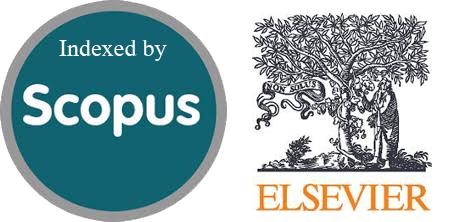Serum Level of High Mobility Group Box1 Protein Among Iraqi Psoriatic Patients and its Relationship with Disease Severity and Comorbidities
DOI:
https://doi.org/10.54133/ajms.v8i2.1949Keywords:
Comorbidities, Disease Severity, HMGB1, PsoriasisAbstract
Background: Psoriasis is a persistent, inflammatory skin condition characterized by distinct clinical and histological features. The disease is linked to systemic inflammation and immune system dysregulation. High Mobility Group Box 1 (HMGB1) is one of the innate immunity components that have been implicated in disease development and severity. Objective: Evaluate the mean serum levels of High Mobility Group Box1 Protein (HMGB1) in Iraqi patients with psoriasis and analyze its potential association with disease severity and complications. Methods: A case-control study was conducted on 110 individuals. The patient group included 60 randomly selected patients with a mean age of 37.23±8.26 years old, and the control group included 50 randomly selected volunteers (35.32±7.53 years). Blood specimens were obtained from all participants after acquiring verbal permission. The ELISA technique was used to measure the serum levels of HMGB1. Results: The mean level of HMGB1 was 7.21±0.75 ng/ml in patients compared to 6.42±0.69 ng/ml in controls, although the difference was non-significant (p=0.451). The mean level of HMGB1 was significantly associated with response to treatment. Also, the mean level of HMGB1 was significantly higher in individuals with metabolic syndrome. In contrast, the mean level of HMGB1 was non-significantly associated with other complications and disease severity. Conclusions: HMGB1 serum level was elevated non-significantly in psoriasis patients, but it was significantly correlated with metabolic syndrome and good treatment response, so it could be used as a predictor for metabolic syndrome and good management.
Downloads
References
Hernandez-Nicols BF, Robledo-Pulido JJ, Alvarado-Navarro A. Etiopathogenesis of psoriasis: integration of proposed theories. Immunol Invest. 2024;53(3):348-415. doi: 10.1080/08820139.2024.2302823. DOI: https://doi.org/10.1080/08820139.2024.2302823
Zhang Y, Dong S, Ma Y, Mou Y. Burden of psoriasis in young adults worldwide from the global burden of disease study 2019. Front Endocrinol. 2024; 15:1308822. doi: 10.3389/fendo.2024.1308822. DOI: https://doi.org/10.3389/fendo.2024.1308822
Parisi R, Iskandar IYK, Kontopantelis E, Augustin M, Griffiths CEM, Ashcroft DM, etal. National, regional, and worldwide epidemiology of psoriasis: systematic analysis and modelling study. BMJ. 2020;369:m1590. doi: 10.1136/bmj.m1590. DOI: https://doi.org/10.1136/bmj.m1590
Michalek IM, Loring B, John SM. A systematic review of worldwide epidemiology of psoriasis. J Eur Acad Dermatology Venereol. 2017;31(2):205–212. doi: 10.1111/jdv.13854. DOI: https://doi.org/10.1111/jdv.13854
Al-Ghuzi AAS, jabber Ibrahim Z, Kawen AAH. The epidemiology of dermatological diseases in Al-Nasiriya City 2018. Univ Thi-Qar J Med. 2020;20(2):12–23.
Gianfredi V, Casu G, Bricchi L, Kacerik E, Rongioletti F, Signorelli C. Epidemiology of psoriasis in Italy: burden, cost, comorbidities and patients' satisfaction. A systematic review. Acta Biomed. 2022;93(6):e2022332. doi: 10.23750/abm.v93i6.13177.
Salgado-Boquete L, Carrascosa JM, Llamas-Velasco M, Ruiz-Villaverde R, de la Cueva P, Belinchón I. A new classification of the severity of psoriasis: what’s moderate psoriasis? Life. 2021;11(7):627. doi: 10.3390/life11070627. DOI: https://doi.org/10.3390/life11070627
Daugaard C, Iversen L, Hjuler KF. Comorbidity in adult psoriasis: Considerations for the clinician. Psoriasis (Auckl). 2022;12:139-150. doi: 10.2147/PTT.S328572. DOI: https://doi.org/10.2147/PTT.S328572
Ammar M, Souissi-Bouchlaka C, Gati A, Zaraa I, Bouhaha R, Kouidhi S, Ben Ammar-Gaied A, Doss N, Mokni M, Marrakchi R. Psoriasis: physiopathology and immunogenetics. Pathol Biol (Paris). 2014;62(1):10-23. doi: 10.1016/j.patbio.2013.07.014. DOI: https://doi.org/10.1016/j.patbio.2013.07.014
Abdelnoor AM, Al-Akl N. Factors involved in the pathogenesis of psoriasis. Adv Stud Med Sci. 2013;1(2):75–94. DOI: https://doi.org/10.12988/asms.2013.13008
Gao Y, Gong B, Chen Z, Song J, Xu N, Weng Z. Damage-associated molecular patterns, a class of potential psoriasis drug targets. Int J Mol Sci. 2024;25(2):771. doi: 10.3390/ijms25020771. DOI: https://doi.org/10.3390/ijms25020771
Morizane S, Yamasaki K, Mühleisen B, Kotol PF, Murakami M, Aoyama Y, et al. Cathelicidin antimicrobial peptide LL-37 in psoriasis enables keratinocyte reactivity against TLR9 ligands. J Invest Dermatol. 2012;132(1):135-143. doi: 10.1038/jid.2011.259. DOI: https://doi.org/10.1038/jid.2011.259
Casciaro M, Di Salvo E, Gangemi S. HMGB-1 in psoriasis. Biomolecules. 2021;12(1):60. doi: 10.3390/biom12010060. DOI: https://doi.org/10.3390/biom12010060
Borsky P, Fiala Z, Andrys C, Beranek M, Hamakova K, Malkova A, et al. Alarmins HMGB1, IL-33, S100A7, and S100A12 in psoriasis vulgaris. Mediators Inflamm. 2020;2020:8465083. doi: 10.1155/2020/8465083. DOI: https://doi.org/10.1155/2020/8465083
Yildirim D, Baykul M, Edek YC, Gulengul M, Alp GT, Eroglu FS, et al. Could serum HMGB1 levels be a predictor associated with psoriatic arthritis? Biomark Med. 2023;17(20):871–80. doi: 10.2217/bmm-2023-0490. DOI: https://doi.org/10.2217/bmm-2023-0490
Fredriksson T, Pettersson U. Oral treatment of pustulosis palmo-plantaris with a new retinoid, Ro 10-9359. Dermatology. 1979;158(1):60–64. doi: 10.1159/000250744. DOI: https://doi.org/10.1159/000250744
Bergmann C, Strohbuecker L, Lotfi R, Sucker A, Joosten I, Koenen H, et al. High mobility group box 1 is increased in the sera of psoriatic patients with disease progression. J Eur Acad Dermatol Venereol. 2016 Mar;30(3):435–41. doi: 10.1111/jdv.13564. DOI: https://doi.org/10.1111/jdv.13564
Chen T, Guo Z pei, Li L, Wang L, Jia R zhen, Cao N, et al. Increased HMGB1 serum levels and altered HMGB1 expression in patients with psoriasis vulgaris. Arch Dermatol Res. 2013;305:263–267. doi: 10.1007/s00403-013-1330-0. DOI: https://doi.org/10.1007/s00403-013-1330-0
Strohbuecker L, Koenen H, van Rijssen E, van Cranenbroek B, Fasse E, Joosten I, et al. Increased dermal expression of chromatin-associated protein HMGB1 and concomitant T-cell expression of the DNA RAGE in patients with psoriasis vulgaris. Psoriasis (Auckl). 2019;9:7-17. doi: 10.2147/PTT.S190507. DOI: https://doi.org/10.2147/PTT.S190507
Zhu X, Dou Y, Lin Y, Chu G, Wang J, Ma L. HMGB1 regulates Th17 cell differentiation and function in patients with psoriasis. Immun Inflamm Dis. 2024;12(2):e1205. doi: 10.1002/iid3.1205. DOI: https://doi.org/10.1002/iid3.1205
Haynes L. Aging of the immune system: Research challenges to enhance the health span of older adults. Front Aging. 2020;1:602108. doi: 10.3389/fragi.2020.602108. DOI: https://doi.org/10.3389/fragi.2020.602108
Lee KA, Flores RR, Jang IH, Saathoff A, Robbins PD. Immune senescence, immunosenescence and aging. Front Aging. 2022;3:900028. doi: 10.3389/fragi.2022.900028. DOI: https://doi.org/10.3389/fragi.2022.900028
Ortona E, Pierdominici M, Rider V. Editorial: Sex hormones and gender differences in immune responses. Front Immunol. 2019;10:1076. doi: 10.3389/fimmu.2019.01076. DOI: https://doi.org/10.3389/fimmu.2019.01076
Dias SP, Brouwer MC, van de Beek D. Sex and gender differences in bacterial infections. Infect Immun. 2022;90(10):e0028322. doi: 10.1128/iai.00283-22. DOI: https://doi.org/10.1128/iai.00283-22
Tampa M, Sarbu MI, Mitran MI, Mitran CI, Matei C, Georgescu SR. The pathophysiological mechanisms and the quest for biomarkers in psoriasis, a stress-related skin disease. Dis Markers. 2018;2018:5823684. doi: 10.1155/2018/5823684. DOI: https://doi.org/10.1155/2018/5823684
Nestle FO, Kaplan DH, Barker J. Psoriasis. N Engl J Med. 2009;361(5):496-509. doi: 10.1056/NEJMra0804595. DOI: https://doi.org/10.1056/NEJMra0804595
Lee EJ, Han KD, Han JH, Lee JH. Smoking and risk of psoriasis: A nationwide cohort study. J Am Acad Dermatol. 2017;77(3):573-575. doi: 10.1016/j.jaad.2017.04.015. DOI: https://doi.org/10.1016/j.jaad.2017.04.015
Kanda N. Psoriasis: Pathogenesis, comorbidities, and therapy updated. Int J Mol Sci. 2021;22(6):2979. doi: 10.3390/ijms22062979. DOI: https://doi.org/10.3390/ijms22062979
Ge Y, Huang M, Yao YM. The effect and regulatory mechanism of high mobility group Box-1 protein on immune cells in inflammatory diseases. Cells. 2021;10(5):1044. doi: 10.3390/cells10051044. DOI: https://doi.org/10.3390/cells10051044
Singh H, Agrawal DK. Therapeutic potential of targeting the HMGB1/RAGE axis in inflammatory diseases. Molecules. 2022;27(21):7311. doi: 10.3390/molecules27217311. DOI: https://doi.org/10.3390/molecules27217311
Wang H, Qu H, Deng H. Plasma HMGB-1 levels in subjects with obesity and type 2 diabetes: A cross-sectional study in China. PLoS One. 2015;10(8):e0136564. doi: 10.1371/journal.pone.0136564. DOI: https://doi.org/10.1371/journal.pone.0136564
Kamel MN, Hassan EM, Sobhy MM, El Sayes MMI. Role of high-mobility group box-1 as a marker of disease severity and diagnosis of metabolic syndrome in psoriatic patients. Egypt J Dermatol Venerol. 2017;37(2):69–75. doi: 10.4103/ejdv.ejdv_10_17. DOI: https://doi.org/10.4103/ejdv.ejdv_10_17
Chen R, Kang R, Tang D. The mechanism of HMGB1 secretion and release. Exp Mol Med. 2022;54(2):91–102. doi: 10.1038/s12276-022-00736-w. DOI: https://doi.org/10.1038/s12276-022-00736-w
Zandarashvili L, Sahu D, Lee K, Lee YS, Singh P, Rajarathnam K, et al. Real-time kinetics of high-mobility group box 1 (HMGB1) oxidation in extracellular fluids studied by in situ protein NMR spectroscopy. J Biol Chem. 2013;288(17):11621-11627. doi: 10.1074/jbc.M113.449942. DOI: https://doi.org/10.1074/jbc.M113.449942

Downloads
Published
How to Cite
Issue
Section
License
Copyright (c) 2025 Al-Rafidain Journal of Medical Sciences ( ISSN 2789-3219 )

This work is licensed under a Creative Commons Attribution-NonCommercial-ShareAlike 4.0 International License.
Published by Al-Rafidain University College. This is an open access journal issued under the CC BY-NC-SA 4.0 license (https://creativecommons.org/licenses/by-nc-sa/4.0/).











